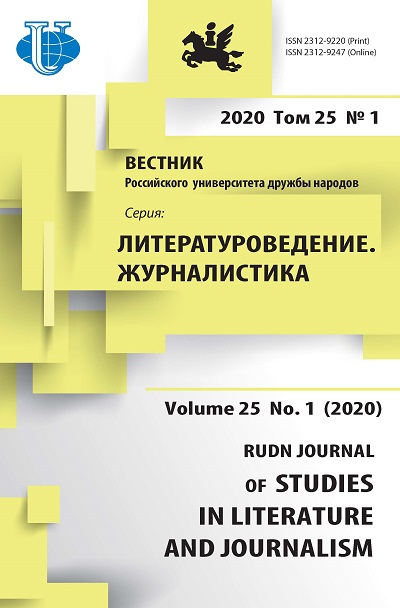Self-identification in modern ironic poetry
- Authors: Karasik V.I.1
-
Affiliations:
- Pushkin State Russian Language Institute
- Issue: Vol 25, No 1 (2020)
- Pages: 33-45
- Section: LITERARY CRITICISM
- URL: https://journals.rudn.ru/literary-criticism/article/view/23606
- DOI: https://doi.org/10.22363/2312-9220-2020-25-1-33-45
- ID: 23606
Cite item
Full Text
Abstract
The article deals with modern Russian ironic poetic miniatures; they are complex formations containing several levels of subject self-representation. Two types of such texts have been analyzed - aphoristic poetry and ironic internet miniatures. They are very popular and make a new genre of net discourse in the Russian sector of the Internet (creatives). The main technical device of such texts creation is paradoxical contamination of contradictions. Such poems are saturated with allusions and parodies. Self-identification in such texts is inseparably connected with critical evaluation of human opportunities limitation, absurdity of existence and imperfection of the world.
About the authors
Vladimir I. Karasik
Pushkin State Russian Language Institute
Author for correspondence.
Email: vkarasik@yandex.ru
Doctor of Philology, Professor of General and Russian Linguistics Department
6 Akademika Volgina St, Moscow, 117485, Russian FederationReferences
- Abushenko, V.L. (2001). Identichnost' [Identity]. In A.A. Gricanov (Ed.), Novejshij filosofskij slovar' (pp. 400–404). 2nd ed. Minsk: Knizhnyj dom Publ.
- Issers, O.S. (2012). Lingvokognitivnye igry v prostranstve interneta: ot smeshnogo do ser'eznogo [Linguistic and cognitive games in internet space: from fun to serious]. In T.A. Gridinoj (Ed.), Lingvistika kreativa – 2: collective monograph (pp. 101–120). Ekaterinburg: Ural. gos. ped. un-t Publ.
- Karasik, V.I. (2018). Kreativy v setevom diskurse [Creatives in network discourse]. Vestnik Moskovskogo oblastnogo gosudarstvennogo universiteta. Seriya: Lingvistika, (5), 29–44.
- Malahov, V.S. (1998). Neudobstva s identichnost'yu [Identity issues]. Voprosy filosofii, (2), 43–53.
- Nikolaev, V.G. (1998). Identichnost'. Kul'turologiya. XX vek [Identity. Culturology. XX century]: encyclopedia: in 2 vols. (vol. 1, pp. 238–239). Saint Petersburg: Universitetskaya kniga Publ.
- Petrenko, S.N. (2017). Zhanrovye modeli postfol'klora v russkoj postmodernistskoj literature poslednej chetverti XX – nachala XXI veka [Genre models of post-folk folklore in Russian postmodern literature of the last quarter of the XX – beginning of the XXI century] (abstract of the dissertation of the Candidate of Philological Sciences). Volgograd.
- Remchukova, E.N. (2013). Massovyj lingvokreativ: preodolenie standarta [Mass linguality: bridging standard]. Bulletin of Peoples’ Friendship University of Russia. Series: Theory of Language. Semiotics. Semantics, (2), 83–89.
- Rikyor, P. (1995). Povestvovatel'naya identichnost' [Narrative identity]. Germenevtika. Etika. Politika: Moskovskie lekcii i interv'yu (pp. 19–37). Moscow: Academia Publ.
- Rogacheva, N.B. (2011). Struktura i funkcionirovanie vtorichnyh rechevyh zhanrov internetkommunikacii (na materiale russkogo i anglijskogo yazykov) [Structure and functioning of secondary speech genres of Internet communication (based on the material of Russian and English languages)] (abstract of the dissertation of the Candidate of Philological Sciences). Saratov.
- Bartle, R.A. (2003). Designing virtual worlds. Berkeley: New Riders Publishing.
- Deumert, A. (2014). The performance of a ludic self on social network(ing) sites. In P. Seargeant & C. Tagg (Eds.), The Language of Social Media: Identity and Community on the Internet (pp. 23–45). New York: Palgrave Macmillan.
- Spears, R. (2005). Personal and Social Identity. In Maryanne Cline Horowitz (Ed.), New Dictionary of the History of Ideas: in 6 vols. (vol. 3, p. 1086). New York: Charles Scribner’s sons.
Supplementary files















